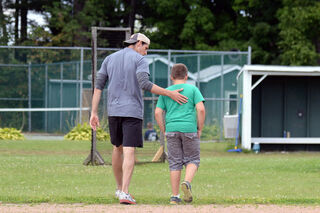

Stephen Wallace is director of the Center for Adolescent Research and Education (CARE), a national collaborative of institutions and organizations committed to increasing positive youth outcomes.
Pitching Magic
When unresolved grief goes to summer camp.

- Camp appears to be a key context for developing relationship skills. This is consistent with past research on camp, but [new] findings suggest that the relationship skills young people gain at camp might play a role beyond the camp experience.
- As a context for developing relationship skills, preliminary findings suggest that camp is an integral part of a young person’s overall learning, alongside school and other educational contexts.
- Camp is a unique learning experience that appears to promote skills transferable to 21st century school and work contexts.
- Preliminary findings suggest that camp is a safe place for young people to explore who they are and how they want to be viewed by others.
- Camp gives campers the opportunity to practice being around and appreciating people with attitudes, values, and abilities different from their own.
- Camp helped me make new friends. (96%)
- Camp helped me to get to know kids who are different from me. (93%)
- The people at camp helped me feel good about myself. (92%)
- At camp, I did things I was afraid to do at first. (74%)
Their parents explain the outcomes for their kids, including the following.
- My child gained self-confidence at camp. (70%)
- My child continues to participate in some of the new activities he or she learned at camp. (63%)
- My child remains in contact with friends made at camp. (69%)
As leaders in “trauma-informed” education, summer camps also support children who have experienced trauma in their lives.
In her Camping Magazine article “A Time to Grieve: Dealing With Loss and Change This Summer and Beyond” editor-in-chief Marcia Ellett points to work of camp professionals, and others, in ensuring “best practices and educational resources to facilitate the mental, emotional, and physical health of grieving children and their families.” She cites the important impact of the National Alliance for Grieving Children, a nonprofit organization that raises awareness about the needs of children and teens who are grieving a death and provides education and resources for anyone supporting them (Ellett, 2020).
It takes a village.
Speaking about trauma-informed programming, Linda Ebner Erceg, RN, MS, PHN, adds, “That also means not only understanding the prevalence of trauma … but also recognizing that trauma histories will arrive with some campers and staff, and those histories have the potential to color the camp experience. Being trauma-informed also means assessing camp practices to determine their potential to trigger trauma responses …” (Ebner Erceg, 2018).
Trauma is the experience of a person to an event that is emotionally painful or stressful. Trauma can result in lasting mental and physical effects and is defined by the experience of the survivor. According to recognizetrauma.org
The behaviors caused by trauma sometimes depend on a child’s age when the symptoms appear. However, some symptoms can affect all children, including:
- Major changes in eating or sleeping
- Nightmares
- Anger or rage
- Unreasonable fear
- Unusually strong startle reactions
What if trauma-informed became trauma-resolved? It has, in the form of Experience Camps, which offer free one-week camps for boys and girls “who have experienced the death of a parent, sibling or primary caregiver.”
Sara Deren, Chief Experience Officer, and Cara Allen, Chief Clinical Officer, told me on a Zoom call that their camps provide a blend of typical camp activities with a clinical component to help kids process grief:
Grief can change the trajectory of a child’s life. The only question is how. We know that grief camp can help foster resilience. It's a place where kids can laugh, cry, play, create, remember the person who died, or forget the grief that weighs them down. It's a place where they can feel “normal,” because everyone there has been through something similar and understands what it's like to lose someone important to them.
In interviews, three Experience Camps campers, Peyton (age 10), Nani (age 16), and Graham (age 17) – each of whom lost a parent – told me about their losses and reflected on their stays.
Peyton:
- I lost my dad when I was five. My mom has been there for me and when I cry, she says life is unfair sometimes.
- Camp was very fun, though I was scared of the fish. I made a lot of friends I could talk to. I liked the water swing into the lake and I did it a bunch of times, even though I was afraid.
-
Nani:
- The day I celebrated my 10th birthday is the day my dad passed away. It helps to share memories of him with my brother and uncle.
- At camp, I have a community of people who understand the loss of a parent. It’s helpful to recognize I am not alone in this and that I am not as broken as I was feeling, I went to camp for six years, made great friends, and had group chats. Everybody knows you as a person and encourages you to be happy again and not feel guilty about it. Going through grief makes time stop, so it’s powerful to have the camp experience.
Graham:
- When I was in sixth grade, I was walking home from school and saw my dad’s car in the driveway two hours earlier than usual – not a good sign. My mom had brain cancer with chemo and radiation for five years. I was confused and dazed but I never lost hope. My relationship with my dad is strong, so I talk about it with him at dinner every night. When I have my breakdowns, I call him. I was sad and angry. I was in denial. Being vulnerable is the biggest challenge.
- My first summer at camp in Maine was a little scary. I was pretty silent but listened to the other kids, which was helpful. I thought, ‘Wow, they’re strong.’ Every one of them lost someone they loved, which helped us to form a community. I am afraid of heights, but I did the rock-climbing wall anyway. And I learned to comfort others. It’s the best week of the year.
The common themes of loss, struggle, challenge, and positive risk-takingabound. Pitching the magic of summer camp for children with unresolved grief.
Information about other camps for grieving children, including Camp Amanda the Panda, Camp Erin, and Comfort Zone Camp can be found herehttps://cdn.psychologytoday.com/sites/all/modules/contrib/extlink/extlink_s.png"); width: 1px; height: 1px; position: absolute; overflow: hidden; clip: rect(0px, 0px, 0px, 0px); white-space: nowrap; clip-path: inset(50%); border: 0px; background-position: 2px center; background-repeat: no-repeat no-repeat;">.
References
ACA. (2020a). Research and evaluation. American Camp Association. https://www.acacamps.org/research (30 Nov. 2020).
ACA. (2020b). The value of camp. Benefits of Camp. American Camp Association. https://www.acacamps.org/campers-families/because-camp/benefits-camp/value-camp (30 Nov. 2020).
Browne, L. (2018). Research 360: promising themes from phase 1 of the 5-year impact study. January 29, 2018. American Camp Association. https://www.acacamps.org/news-publications/blogs/research-360/research-360-promising-themes-phase-1-5-year-impact-study (30 Nov. 2020).
Stephen Wallace is director of the Center for Adolescent Research and Education (CARE), a national collaborative of institutions and organizations committed to increasing positive youth outcomes.










